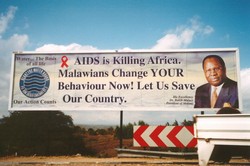AFRICA: AIDS death toll could reach 80 million by 2025, says new report
[This report does not necessarily reflect the views of the United Nations]
|

? ?IRIN
An HIV/AIDS awareness billboard in Malawi
|
ADDIS ABABA, 4 March (PLUSNEWS) - More than 80 million people living in Africa could die from AIDS by 2025 unless concerted actions are taken that could save some of these lives, a new report by UNAIDS said on Friday.
Entitled, "AIDS in Africa: Three scenarios to 2025", the report paints a bleak picture of the impact of HIV on the continent. It gives a detailed glimpse into the epidemic over a 20-year period and outlines three different scenarios.
According to the report, the worst of the epidemic is still to come. It says there is no magic bullet solution and there is a danger of AIDS fatigue, meaning the momentum to fight the epidemic could wane. Women, it adds, were increasingly bearing the brunt of the epidemic.
"There is no single policy prescription that will change the outcome of the epidemic," the report, due to be launched in Addis Ababa on Friday by UNAIDS head Peter Piot, states. "The death toll will continue to rise no matter what is done.
"Above all, these scenarios tell us that while on the one hand, any action is already too late for the millions who have died from AIDS, on the other hand, there is still time to change the future for many, many millions more," it adds.
Even with massive funding and better treatment the number of people in Africa who are going to die from AIDS is likely to top 67 million in the near future, the report said.
UNAIDS estimates that nearly US $200 billion is needed to save 16 million people from death and 43 million people from becoming infected. It did, however, stress that the lessons of the past 20 years were crucial for curbing the spread of HIV/AIDS over the next 20, saying major inroads could be made if the will was there.
"What we do today will change the future," urges the report, drawn up by leading experts and people living with HIV. "These scenarios demonstrate that, while societies will have to deal with AIDS for some time to come, the extent of the epidemic's impact will depend on the responses and investment now."
It added: "If by 2025 millions of African people are still becoming infected with HIV each year, these scenarios suggest that it will not be because there was no choice. It will be because, collectively, there was insufficient political will to change behaviour at all levels from the institution, to the community, to the individual and halt the forces driving the AIDS epidemic in Africa."
UNAIDS pointed out five "critical and uncertain forces", which it said were driving HIV/AIDS in Africa. First was the disintegration of society and community. Second were the beliefs about how HIV is spread and how it can be prevented. Next, mobilising resources - not just funding but increased coordination, using new knowledge about the virus and its spread. Finally, UNAIDS listed the importance of power in society and whether it is centralised or shared, and the importance of gender and age.
At the moment, UNAIDS added, 25 million people were infected and life expectancy in nine African countries has dropped below 40. There were 11 million orphans, while 6,500 people were dying each day. In 2004, some 3.1 million people were newly infected.
The three scenarios spell out a best-case situation, a mid-case and a current-case scenario drawn out over two decades.
The first scenario involves a substantial and sustained increase in funding to $195 billion. According to UNAIDS, under this plan, trade rules will improve, aid flows will double and HIV/AIDS specific funding increasing nine percent year on year - with spending reaching $10 billion per year by 2014.
By 2019, spending can begin to decline as the number of people living with HIV/AIDS begins, for the first time since the emergence of the virus in the 1980s, to fall.
The second scenario sees African leaders take a stand, where HIV/AIDS is tackled as part of a medium- and long-term strategy, regardless of fluctuating aid or economic growth. UNAIDS estimated that under this scenario, 75 million people will have died from AIDS by 2025, while 65 million will be infected. Some $98 billion under this situation would help avert 24 million new infections.
Under the worst-case scenario, experts have plotted current anti-HIV/AIDS policies and funding over the next two decades and conclude that the epidemic will still present a "clear and present danger". They see a future where poverty further depletes capacity to fight AIDS, leaders go for quick results to meet quotas rather than long term change, divisions and stigma in society, and aid dependency and Africa failing to benefit from trade rounds or foreign investment exacerbate the crisis.
The death toll - equal to one in ten of Africa's current population - will leap fourfold, while infections could soar from the current 25 million, UNAIDS added. It estimates there will be 83 million cumulative deaths, 89 million infections, and the cost of fighting HIV/AIDS will be around $70 billion.
The report can be accessed on the UNAIDS website: www.unaids.org
[ENDS]
|

